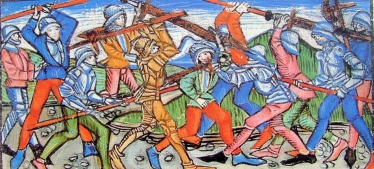12.7. 1260 Battle of Kressenbrunn
Categories: Years of war and revolution , Calendar

The Battle of Kressenbrunn in mid-July 1260 earned Přemysl Otakar II the greatest glory and the nickname "Iron and Gold". The King of Hungary suffered a crushing defeat.
Today, however, you would look for Kressenbrunn on a map in vain. Rather, you would find the Lower Austrian village of Engelhartstetten, which lies just fifteen kilometres northwest of Bratislava on the Moravianm field, a vast plain which, despite its name, is not in Moravia but in Lower Austria.
It was named after the Morava River, which practically forms the Austrian-Slovak border from its confluence with the Dyje. Two great battles were fought here by Přemysl Otakar II, of whom František Palacký wrote that "he was in the ranks not only of the Přemyslids, but also of the Czech rulers in general, a person of great excellence without opposition". The first of the two battles on the lower Morava River brought him fame, territorial gains and a new wife, while the second brought defeat and death.
"In 1252, Přemysl Otakar II married the heiress of the Babenbergs, Margaret, a generation older, and defended Lower and Upper Austria against King Béla IV of Hungary, who also had his eye on them. However, when Přemysl took control of Styria in early 1260, from where Béla's son Štěpá was expelled by the local nobility.n, the Bohemian-Hungarian war was again imminent," writes Jan Bauer in his book Revolutionary Events in Czech History.
The Hungarian monarch felt insulted and humiliated by Přemysl's actions. He summoned a massive army, in whose ranks, along with the Hungarians, the Croats, Serbs, Bosnians, Wallachians and Bulgarians marched against the Czechs and Moravians, the Kumawho had left their original homeland on the steppes of South Russia and settled in the Pannonian Plain, as well as bands of the dreaded Tatars. According to František Palacký, the army numbered around 140,000 fighters.
For two weeks, however, nothing happened; the soldiers shouted at each other across the water, cursing, but otherwise it was quiet. No one wanted to risk an attack across the river. "It was not until Přemysl sent the Austrian judge Ota of Meissov, a negotiator, to the Hungarian camp to offer Béla IV. Agreement. One army would cross the river undisturbed, while the other would retreat and then the two armies would form up on the open ground and fight a battle," Bauer describes.
The Hungarian king decided that his army would cross the Morava, while the Czech monarch was to retreat and wait for the Hungarians to form a line on his bank. The movement took place on 12 July 1260. There are two versions of what happened next. According to one, the Hungarians attacked Otakar's unprepared camp from the side. The other version is that Otakar broke the truce and attacked the Hungarians.
But the result is clear, the Hungarian king suffered a crushing defeat. "The defeated Béla had to make peace, in which he surrendered Styria. To dampen the hostility of Hungary, Přemysl divorced the aging Margaret of Babenberg and remarried Kunhuta. In Austrian and Alpine politics he relied on the support of the Austrian episcopate," write Jaroslav Pánek and Oldřich Tůma in their book History of the Bohemian Lands.
Jan Bauer, Revolutionary Events in Czech History, Jaroslav Pánek and Oldřich Tůma, History of Czech Lands, https://britishbattles.homestead.com/
The article is included in categories: